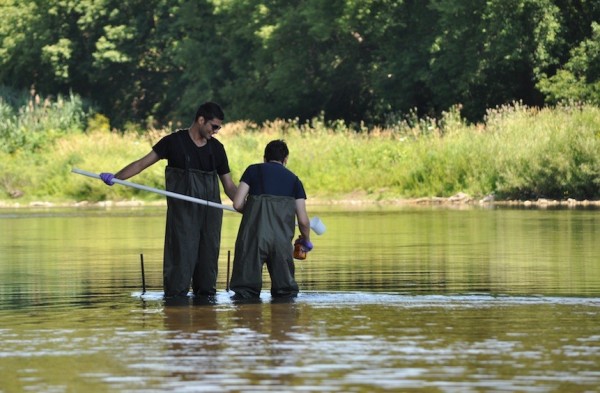
Fish Exposed to Cocaine in Canadian Rivers: New Research Insights

McGill University
Looking for traces of illegal drugs in water
Both prescription and illegal drugs such as morphine, cocaine and oxycodone have been found in surface waters in Canadian rivers. New research from McGill shows that wastewater discharged from wastewater treatment plants in the Grand River watershed of southern Ontario has the potential to contaminate sources of drinking water with these drugs.
The study, which was just published in the journal Environmental Toxicology & Chemistry, shows that although these drugs are found only in relatively limited quantities in the river water, their concentration did not decline with distance downstream from the wastewater treatment plant discharge. Moreover, many of the drugs were not removed completely during drinking water treatment.
A wastewater treatment plant cleans the bulk of contaminants from the wastewater which arrives from sources ranging from household wastes to chemical plants prior to discharging the water into the river. At some distance downstream in the river, a drinking water treatment plant then further treat the water prior to consumption.
“Improving our wastewater treatment processes can help clean up our drinking water,” said lead author Prof. Viviane Yargeau, of McGill’s Department of Chemical Engineering. “While previous studies have shown that there are trace elements of various chemicals that remain in our drinking water, what is novel about this research is that we looked at the chemicals that are found in the water course between the wastewater treatment plant and the drinking water treatment plant. And what we found has some disturbing implications for the aquatic environment.”
“These results demonstrated a link between wastewater plant discharges and quality of potable water sources,” said Prof. Yargeau. “Although drinking water treatment plants remove most of the contaminants found in our drinking water, we believe that if improvements are made to wastewater treatment plants to protect the sources of drinking water, this will prove a more effective way of dealing with the problem in the long run — as this strategy would also protect the aquatic environment and all the plants, insects and fish that are found there.”
The next stage in Prof. Yargeau’s research will be a five-year project to look into how improvements of wastewater treatment and natural processes along rivers impact the presence of contaminants of concern in our drinking water.
To contact the researcher directly:Viviane.yargeau@mcgill.ca, Tel:514.398.2273 Website: Yargeau 3Cs Laboratory
To read the full article: “Linking drugs of abuse in wastewater to contamination of surface and drinking water” by A. Rodayan et al in Environmental Toxicology and Chemistry: http://onlinelibrary.wiley.com/doi/10.1002/etc.3085/full
The research was funded by: Natural Sciences and Engineering Council of Canada, the Ministry of Research and Innovation for the Province of Ontario, les Fonds québécois de la recherche sur la nature et les technologies, and the Eugenie Ulmer Lamothe Fund scholarships.
McGill Media Relations contact:
Katherine Gombay
Media Relations
McGill University
514-398-2189
http://www.mcgill.ca/newsroom/
http://twitter.com/McGilluMedia












